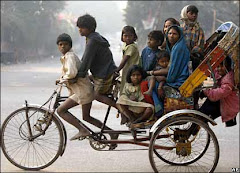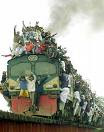 Above is a picture of the the Ambani's in happier times. Founder of Reliance, Mr Dhirubhai Ambani is seated, from left to right standing behind him is Mukesh Ambani, Bill Clinton and Anil Ambani.
Above is a picture of the the Ambani's in happier times. Founder of Reliance, Mr Dhirubhai Ambani is seated, from left to right standing behind him is Mukesh Ambani, Bill Clinton and Anil Ambani.You cannot be conducting business in India for long, without hearing stories about, and references to, the fabulous Ambani family. Listed in 5th and 6th place respectively in the Forbes Rich List, the Ambani’s are incredibly wealthy, flamboyant, politically active and are constant media fodder in terms of their in-house rivalries. The story of this family is the stuff that great cinematic tales are made of. I can only assume that no movie has been made to date, as this story just isn’t over yet...!
This story starts with Dhirajlal Hirachand Ambani , known as Dhirubhai, son of a modest school teacher, born in 1933, and a school drop out - at a time when most of India’s large domestic privately held companies were run by men born of wealth. Building a USD 15 billion empire, this unlikely candidate was to become India’s most remarkable businessman. Ever.
After a stint working in Yemen, Mr Dhirubhai Ambani returned to India in 1962 and founded Reliance with Rs 15,000 (USD 350), initially formed as a textile trading company. Aggressively growing the company, he displayed his acute business acumen taking the company public on the Bombay Stock Exchange in 1977, when Mr Ambani managed to convince millions of middle-class Indians to buy stock (in Reliance) for the first time.
Ambani was famously quoted as saying that he was deaf to the word ‘no’ at a time when corporate India was struggling under over zealous and ill thought out government bureaucracy during the 1980’s, nicknamed the License Raj, which severely restrained the production capacity of private sector companies within India at the time.
As a result of Ambani’s strong leadership, Reliance grew exponentially, as did its stockholders wealth. By 2002, original investors in Reliance had earned 43% per year compounded annual rate of return, and Reliance became the first Indian private-sector company to enter the Fortune 500.
That same year, Mr Dhirubhai Ambani died without leaving a will.
Enter his two sons. Mr Dhirubhai Ambani’s eldest son, Mukesh was promptly elected company chairman, but rumours of discontent between he and his brother Anil began circulating. Viewed as a direct challenge to Mukesh, Anil promptly allied himself with a northern Indian political party, earning himself a seat in India’s upper house of parliament. Reports of the Reliance heir apparent discord abounded and were finally confirmed with a press statement by Mukesh Ambani.
This public admission of rivalry and dispute between the two brothers put 3 million Reliance stockholders on edge, which in turn made the company’s customers, vendors, employees and even government officials nervous. The two rival camps leaked stories about the other to media, who lapped up the story. Concerned banker friends, cabinet ministers, family members and board members all visited the Ambani’s to resolve the differences, to no avail. Months went by with on-going media frenzy through daily headlines from each of the contentious camps. Most people assumed that Reliance’s best days were over.
In March 2005 there was a breakthrough of sorts – in unique Indian fashion. An esteemed astrologer made a prediction in the largest circulating English-language newspaper of India that both brothers would become successful and that Reliance would do better in future times to come. He blamed the planet Mars for their troubles, and stated that Mukesh and Anil Ambani would resolve their differences by spring.
As if on cue, three months later, Kokilabhen Ambani (Dhirubhai’s widow and mother of the two boys) publically declared an amicable split of the Reliance fortune between Mukesh and Anil. It has to be noted that Kokilabhen had consulted religious astrologers well into the night before the announcement. The day of the announcement, the Sensex (India’s version of the Dow Jones Industrial Average) soured to a record high as Indians showed their support in a celebration of the power of motherhood and astrology to resolve disputes.
To western eyes that are unfamiliar with the depth of religious and family involvement in all levels of life in India, this would be hard to comprehend. To do business in India, it is paramount to accept (if not completely understand) that decisions are often based on auspicious dates and that you may be only dealing with one person on the surface, but their decisions will involve (most likely senior) family members.
This won’t affect you reaching your goals, but it may go some way to explaining why negotiations can be drawn out longer than you are used to in the west, and why you may feel that you have achieved nothing in your initial meetings as business was not discussed to the depth that you would have liked. Business in India is about relationships. You need to work on your relationship with your local business partner and as with all relationships; there will be a honeymoon period as your partner gets to know you. Once that relationship is formed, if you have put in the effort, time and patience – you may be surprised at the depth of passion and commitment that your Indian partner will consequently put into the relationship to ensure success and value to all concerned.
The Ambani story continues. Both Mukesh (Reliance Industries) and Anil (Reliance Anil Dhirubhai Ambani Group) have grown their respective businesses despite the seemingly on-going and vocal friction between both parties. Only two weeks ago, in a dispute at the High Court in Mumbai between the brothers, the judge ordered both parties to go and talk with their mother. On reading this, I immediately SMSed a friend to giggle about how cute it sounded that these men who both sit within the top six of the worlds global rich list, and who are responsible for millions of investors, employees and enormous business interests respectively were ordered to seek their mothers wise council!
Being a mother, I like that judgment enormously!
Expect the unexpected in India, but don’t let that put you off.























No comments:
Post a Comment